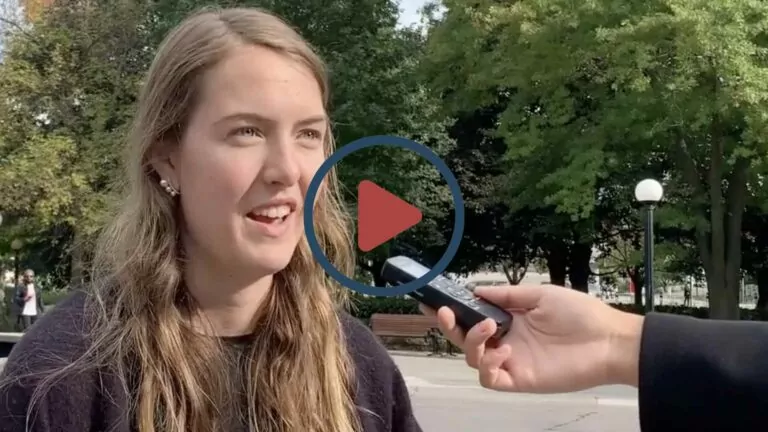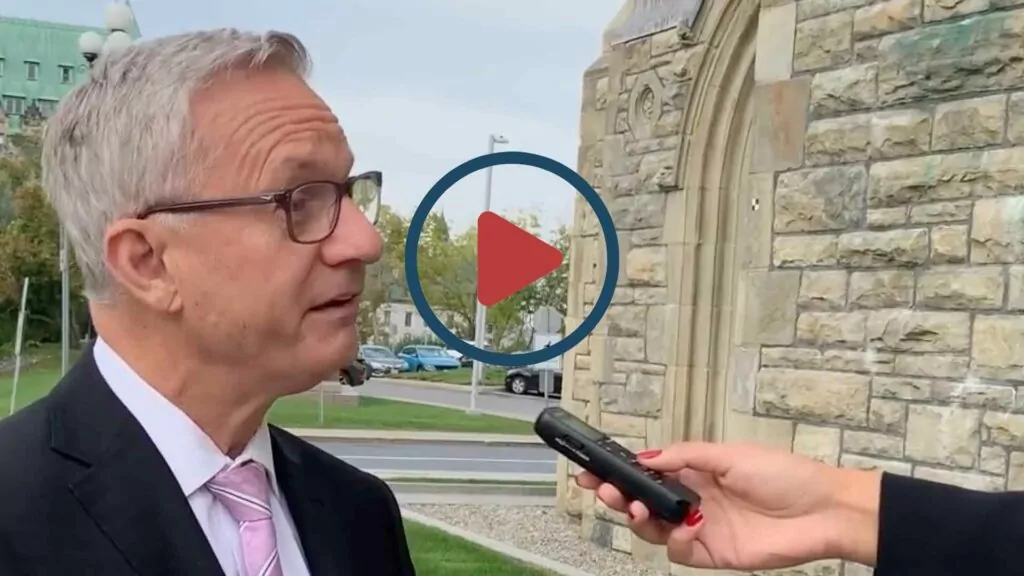TRANSCRIPT
Welcome to Reformed Perspective, I’m Alexandra Ellison.
Today we bring an inspiring video of a young woman who has been working to make a difference in the pro-life movement. Her journey has taken her to the heart of Canada’s capital, Ottawa, where pivotal decisions about the sanctity of human life are made. Through dedication and passion, she has been working tirelessly to reshape the way people view the value of every human life. Join us to learn more about her challenges and her commitment to a cause that has the power to change lives.
Katrina Marshall: “I’m Katrina Marshall. I wanted to be in Ottawa. I was connected with a church here, sort of online during COVID, before I was actually in the city. And it’s not too far away from my parents in Kingston.”
Marshall got involved in the pro-life movement after an internship with the Canadian Center for Bioethical Reform (CCBR), an educational human rights organization dedicated to making abortion unthinkable in Canada.
Katrina Marshall: “I actually heard about the CCBR internship from an ARPA Canada newsletter – my brother shared the ad with me and I applied to their four-month internship March of last year, and I could not go back from that experience. So it’s been kind of life-changing.”
As part of the internship Marshall spent the past two summers traveling around western Canada educating people about the truth of abortion.
Katrina Marshall: “Basically we spend most of it doing pro-life street outreach and various projects. We do what we call ‘Choice Chain’ which is basically a public protest. We use abortion victim photography in all our projects, and we do things like door-knocking, and we do flyer delivery known as postcarding. So we are witnessing to a world that is often very pro-choice in our society, and we have conversations with people. Sometimes we’ll just display the photos so that everyone knows what abortion actually looks like, and it’s incredible. It’s very hard work to do it all day, every day, but it’s so rewarding.
“It’s hard to summarize, but you live for those conversations where they do end up changing their mind. They often end up sharing a lot, even a person, male or female, starts out completely supporting abortion, often by the end of the conversation, they will completely reject abortion in all circumstances, including the hard ones. So when that happens, it’s almost hard to believe, because it’s such a controversial topic. And often we see a lot of people who are really set in their ways, and who don’t want to give us an inch. So when someone changes their mind it kind of just makes your day, sometimes even makes your week, depending on how it goes. But it’s also definitely something that we get a lot of hate for, as you can probably guess. So we get a lot of verbal abuse, and things like that, but it is really worth it for the positive moments.”
Marshall spoke about the process of what having on-the-street conversations is like.
Katrina Marshall: “Everyone is coming from a different place. So we always just try and ask them what they think about abortion, get their viewpoint. Often they’ll bring up a hard circumstance where they think it is justified. Some people support abortion for any reason; some – in fact many, mostly – for limited reasons. So we always want to speak into that, into the specific situations they’re discussing, and the issues they’re raising. Not only that, but [we want to] find out where their ideas are coming from, where that opinion was formed, and what’s going on in their life, to really have compassion for them, and not just for the babies (as we are often accused of).
“So if someone said they supported abortion for most situations, but not for casual encounters which they deem is irresponsible, I would ask them to consider a toddler in that same situation. If someone brought up the case of poverty, I would ask them if they would tell a mother who is in poverty, a mother of a 2-year-old, if she could kill that child to solve that problem. People are often taken aback: ‘Of course not; of course we can’t do that!’ We use this common ground especially to begin. Then we use that analogy with the toddler and question, ‘If we can’t harm born humans, then why can we ever harm the same humans a few months earlier?'”
Changing the general public’s mind about abortion can be a path toward succeeding in political legislation.
Katrina Marshall: “A lot of people have asked me why I do this specifically, and my answer is that there are so many people, especially pro-lifers, who don’t recognize the value of educating the public on the issue of abortion, and how that plays into other arms of the pro-life movement, such as the political arm, or the pastoral crisis arm. If the public doesn’t see that abortion is wrong then these other arms will not succeed. I see a large gap in the educational arm of the movement. What better way to save babies than to to talk with people who don’t think that abortion is wrong at all, and in fact it’s often celebrated.”
As a Christian, Marshall says that she can educate others about abortion as much as possible but at the end of the day it is Jesus Christ who saves lives.
Katrina Marshall: “You can’t change everyone’s mind. When you realize what abortion is, how children are being starved to death, and ripped apart, and no one loves them, it’s hard to recognize that sometimes you’re the only one that will stand up for them. You’re the only one that will love them, and honor their legacy, and it’s hard to recognize that only God can change minds and only He can save lives in this work and you have to surrender that to Him.”
For Reformed Perspective, I’m Alexandra Ellison in Ottawa.












